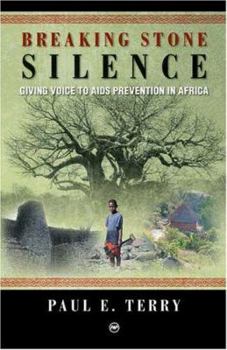Breaking Stone Silence: Giving Voice to AIDS Prevention in Africa
Written to be accessible to both students and lay readers concerned about AIDS in Africa from a world citizen's perspective, this text challenges its audience to place the global AIDS crisis in the context of the learning needs, hopes, orivileges and responsibilities of those in the Western world.
Format:Paperback
Language:English
ISBN:1592214282
ISBN13:9781592214280
Release Date:March 2006
Publisher:Africa World Press
Length:302 Pages
Weight:0.68 lbs.
Dimensions:9.0" x 6.0"
Customer Reviews
3 ratings
Health Odessey in Zimbabwe
Published by Thriftbooks.com User , 19 years ago
Weaving together poignant word pictures, personal stories and critical public health concepts, Dr. Paul Terry creates an illuminating tapestry of life in a sub-Saharan African nation under attack from the Aids pandemic. Terry uses his powers of observation and critical thinking skills to apply the concepts of personal choice and social change to the complicated issues of Aids education, never losing sight of the human stories that play themselves out in the lives and families of this beseiged and beleaguered country. "Breaking Stone Silence" is an absorbing treatment of this challenging global health issue for both the general reader and the health care professional who want to deepen their awareness of another culture and its struggle to create health and healing for its people. Lin Butler, Consultant, Full Circle Health Consulting
Glimmers of Hope
Published by Thriftbooks.com User , 19 years ago
Paul Terry's Breaking Stone Silence combines the personal with the pragmatic in a discussion of the cultural, economic, and political forces impacting the upward-spiraling AIDS epidemic in Zimbabwe. Drawing from his year living in Zimbabwe's capital city, Harare, as a Fulbright Scholar, as well as his community development experiences during his Kellogg Fellowship, Terry weaves personal stories with organizational theories, policies, and successful prevention practices to make AIDS in Africa accessible to those in the Western world. He points out, "Our goal needs to be to understand, not to stand in judgment." The complexity of the AIDS epidemic is mind-boggling. As Terry points out, two-thirds of the 33 million victims in the world are living in sub-Saharan Africa, and Zimbabwe has emerged as the epicenter. Writes Terry, "Imagine every week the Twin Towers collapse with 3,800 of Zimbabwe's young people inside. What's more, it's so commonplace, it doesn't even make the news." And what is yet even more astounding to the author--and the premise of the book--is the government's aloofness and the country's silence about this disease that is taking a staggering toll on Zimbabwe. "I've come to think of the silence around the stigma of AIDS and the quiet malcontent with the ruling party as an immutable barrier people have built around themselves. ...Zimbabwe seems to be a nation with her depression turned inward, a people for whom `breaking the silence' would require a monstrous wrecking ball," Terry writes. Among the many irreconcilable dichotomies Terry enumerates that make prevention efforts so complex in this country are: o Many of Zimbabweans can recite the causes of HIV infection, yet still relate to the belief that illness is an attack from disturbed spirits; o HIV-infected Zimbabweans tend to rely more on traditional healers, or witch doctors, than on proven--albeit costly--Western treatments; and o Drug companies grow rich on drugs that take pennies to produce, yet the pills can't possibly be bought by millions dying for them. Glimmers of hope surface through the despair, and one such spark is an HIV prevention program developed by Terry and two Zimbabwe college graduates, SHAPE Zimbabwe, dedicated to getting young people talking about sex and AIDS. Such discussions begin to address the cultural context of patriarchy in African society that exacerbates the spread of the disease. Terry's final analysis is also the ultimate lesson for the reader: "With my judgmental filter turned off, I more clearly see life in Africa for what it is--people living in a desperate time, taking desperate measures. I've come to see silence about AIDS no more or no less of an issue than silence about joblessness, crime, corrupt politics, or worthless currency. As my curiosity about Zimbabwean's silence has faded, my admiration for their resiliency has grown." Terry is donating proceeds from the sales of the book to a fund dedicated to HIV/AIDS prevention in Africa.
Breaking Stone Silence
Published by Thriftbooks.com User , 19 years ago
Breaking Stone Silence by Paul Terry is a poignant portrait of the current AIDS crisis in Africa, beautifully rendered through personal narrative. While Terry tells the story through the lense of public health, he compellingly weaves vignettes of the people of Zimbabwe and his own year of growth and experience while working in Zimbabwe as a Fulbright Scholar. The book informs, challenges, and ultimately draws us in to the imponderable challenges of the crisis and the moral imperative for action. Along the way, Terry reminds us of our individual and collective capacity to make a difference. While his portrait of suffering is disturbing, it is, most of all, a testimonial to the resiliency and power of the human spirit. The book uniquely integrates public health and story, creating a fascinating look at one of the most important issues of our time.






